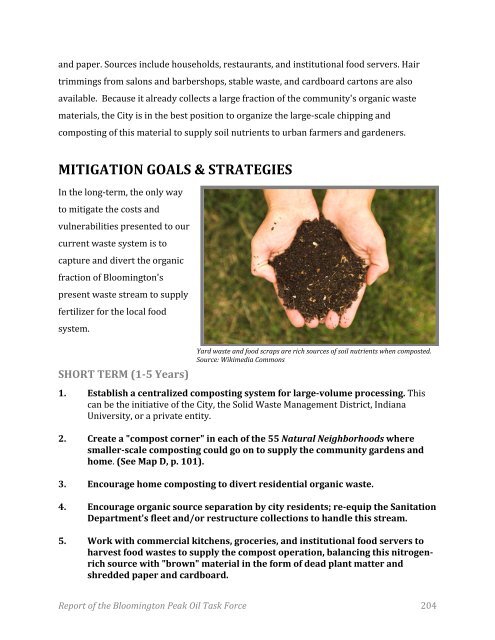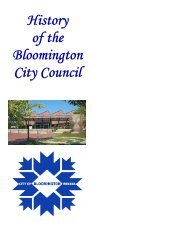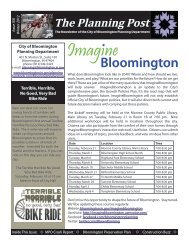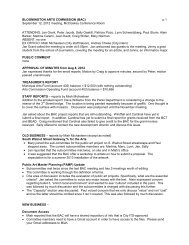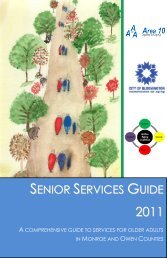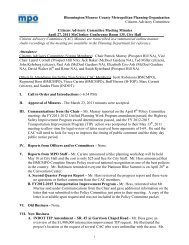Peak Oil Task Force Report - City of Bloomington - State of Indiana
Peak Oil Task Force Report - City of Bloomington - State of Indiana
Peak Oil Task Force Report - City of Bloomington - State of Indiana
Create successful ePaper yourself
Turn your PDF publications into a flip-book with our unique Google optimized e-Paper software.
and paper. Sources include households, restaurants, and institutional food servers. Hair<br />
trimmings from salons and barbershops, stable waste, and cardboard cartons are also<br />
available. Because it already collects a large fraction <strong>of</strong> the community's organic waste<br />
materials, the <strong>City</strong> is in the best position to organize the large‐scale chipping and<br />
composting <strong>of</strong> this material to supply soil nutrients to urban farmers and gardeners.<br />
MITIGATION GOALS & STRATEGIES<br />
In the long‐term, the only way<br />
to mitigate the costs and<br />
vulnerabilities presented to our<br />
current waste system is to<br />
capture and divert the organic<br />
fraction <strong>of</strong> <strong>Bloomington</strong>'s<br />
present waste stream to supply<br />
fertilizer for the local food<br />
system.<br />
SHORT TERM (15 Years)<br />
Yard waste and food scraps are rich sources <strong>of</strong> soil nutrients when composted.<br />
Source: Wikimedia Commons<br />
1. Establish a centralized composting system for largevolume processing. This<br />
can be the initiative <strong>of</strong> the <strong>City</strong>, the Solid Waste Management District, <strong>Indiana</strong><br />
University, or a private entity.<br />
2. Create a "compost corner" in each <strong>of</strong> the 55 Natural Neighborhoods where<br />
smallerscale composting could go on to supply the community gardens and<br />
home. (See Map D, p. 101).<br />
3. Encourage home composting to divert residential organic waste.<br />
4. Encourage organic source separation by city residents; reequip the Sanitation<br />
Department's fleet and/or restructure collections to handle this stream.<br />
5. Work with commercial kitchens, groceries, and institutional food servers to<br />
harvest food wastes to supply the compost operation, balancing this nitrogenrich<br />
source with "brown" material in the form <strong>of</strong> dead plant matter and<br />
shredded paper and cardboard.<br />
<strong>Report</strong> <strong>of</strong> the <strong>Bloomington</strong> <strong>Peak</strong> <strong>Oil</strong> <strong>Task</strong> <strong>Force</strong> 204


